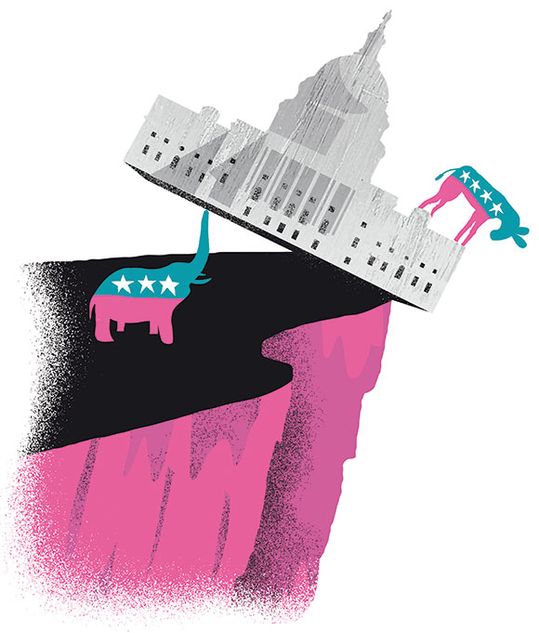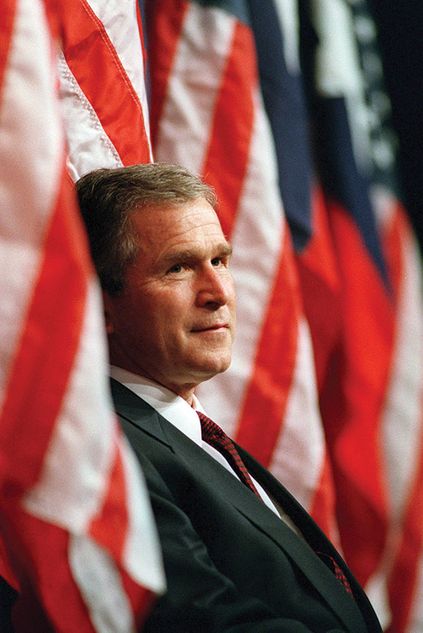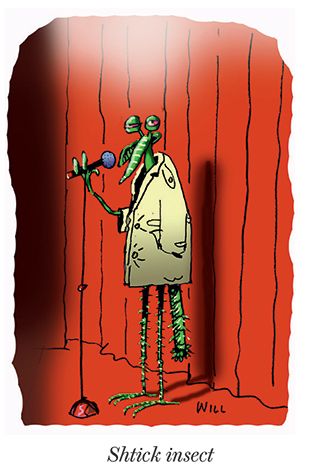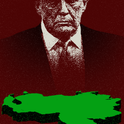American drinkers reveal their mood to the candidates ©Robyn Beck/AFP/Getty Images
Click here to read more from our November 2016 issue
Scroll to the bottom to read an update from Tanenhaus on "Trump Tapes"
Politicians are famous for their memories, which are remarkably detailed, especially when it comes to names and faces, places and dates. But that gift necessitates another, just as important: the gift of forgetting. How much our politicians would rather not remember—defeats, mistakes, embarrassments, not to mention crimes and misdemeanours, malfeasances great and small. Ask Hillary Clinton (the private email server!) or Donald Trump (the “birther” controversy! the tax returns!) Rather, don’t ask them. And please, don’t ask the two parties stuck with these two battered candidates till the Doomsday moment on 8th November, which could well lead to even darker days.
The prospect has pitched Republicans into the most ambitious programme of forgetting in modern political history. Victory in November would make their party his, but it could also make him captive to its agenda, since he has no viable programme of his own. A Republican fail-safe agenda is already in place. Since the spring, House Speaker Paul Ryan—the party’s highest ranking official—has been trying on the role of legislative proconsul. The two would be decidedly awkward partners in the new Republican era.
They have little in common. Steeped in numbers and policy minutiae, Ryan is a celebrated budget hawk. As such, he is the type of Republican who has done most to reduce the capacity of the Federal government, and arguably the governability of America. The long years of penny-pinching and gridlock in Washington have created the impression that it is impotent on the home front, provoking that great sense of frustration and abandonment, which made candidate Trump possible. For his own part, Trump is legendarily bored by budgets and any other policy detail. This is part of his appeal. “Republican maths” has aroused suspicion for many years now, especially when it’s attached to the supply-side doctrine Ryan espouses: tax cuts for the wealthy, reduced spending on the “entitlements” much of the country, including the Republican base, depends on in hard times. The consequences are contributing to the rage of the hour. Add to that Trump’s instinctive feel (possibly the surest since Bill Clinton’s) for what the public wants, and the conflict with Ryan could be titanic, an intra-party battle of the kind not seen in many years.
There are precedents: the 1950s, when the internationalist Republican Dwight Eisenhower struggled against isolationists within his own party; the 1960s, when the Democrat Lyndon Johnson first took on Southern segregationists and then anti-Vietnam doves; the 1970s, when Richard Nixon lost control of the Republicans during Watergate. Generally, the “right side” prevailed, but the cost was always steep. The Democrats remained a weakened party until 1992, when the “New Democrat” Bill Clinton broke through. For Republicans, intra-party strife locked in the rise of “movement conservatism,” still the right’s dominant ideology, though Trump has dealt it a blow—how severe is as yet unclear.
"Obstructionism has rendered Washington impotent, provoking frustration and a sense of abandonment"So many are caught up in the “horse race”—the polls, the gaffes, even, Lord help us, the tweets—that the true import of Trumpism is being missed. While he is anomalous, the politics he represents is not. “America First” nationalism—distrustful of allies, indulgent of dictators, protectionist—has a long history on the right, dating back to the Gilded Age of robber barons, whose company Trump belongs to, in his misshapen way. That politics thrived in the 1920s boom years and was kept alive in the 1930s and 1940s, when the “Old Guard” in the Midwest denounced the New Deal and warned against America’s entry into the Second World War, before Pearl Harbor. It flared up again in the Cold War, opposing the Marshall Plan Nato, and the United Nations—rubbishing these innovations as “world government.” In 1952 the “Old Guard” lost an epic ugly intra-party war against East Coast internationalists and moderates, when Eisenhower—who as the former Supreme Commander of Allied forces in Europe, had a CV that defined him as an internationalist—won the nomination, and then the presidency.
But in 1964, movement conservatism finally dethroned the wealthy East Coast party elite that supposedly pulled all the strings—the “kingmakers,” in the epithet popularised by Phyllis Schlafly, the long-time “movement” activist who died in September, at the age of 92. It won the nomination for Barry Goldwater. The achievement of the intellectual right, first organised around William F Buckley’s magazine National Review and adopted by Republican tribunes like Goldwater and Ronald Reagan, was to fuse all these disparate forces and passions, moderating “Old Guard” sentiments into its own establishmentarian worldview and cosmopolitan style, at once militantly anti-Communist abroad and anti-statist at home. Instead of attacking big-government “giveaways” Buckley, archly invoking the philosopher Eric Voegelin, suggested that Great Society programmes might be futile attempts “to immanentise the eschaton”—deliver heaven on earth.
This is the tone that Trump, and also lest we forget his supporters or fan base, have lost patience with—and who, really, can blame them? Buckley-Reagan style conservatism was, after all, the product of a bygone era. And whereas its doctrinaire demands always used to be kept in check by the pragmatic requirements of politics, this has been much less true during the Obama years, during which an angry Tea Party insurgency pulsated through the Republican Party, and hardened traditional conservative prejudices into unbending dogmas. Meanwhile, a new school of paleo-conservative writers and pundits (some are to be found at the Claremont Review of Books, a quarterly published in Southern California) exult in precisely the possibility that Trump’s East Coast neo-conservative detractors most fear—specifically, that Trumpism could guide the Republican Party backwards, to a future that looks a lot like its pre-modern past. And that could prove lethal in an age of demographic transformation, when 44 per cent of the 80m-plus millennials identify as “non-white.”
"Donald Trump is legendarily bored by budgets and any other policy detail. This is part of his appeal"The usual explanation for his success, especially within “the mainstream media,” is the simple one-two of racism and xenophobia. But those are epithets, not even meaningful descriptions. The truth is that in the 21st century, with the end of the Cold War and the rise of the asymmetrical dangers of terrorist attack, the American public lost much of its appetite for global engagement—military, political, economic, cultural. Even if Trump loses—still the probable outcome—his voters won’t go away and neither will the issues he raised.

Today there are some 42m foreign-born people in America, about 13 per cent of the total population, the highest since the 1920s. Trump’s promises to keep out Muslims and Islamic State (IS) militants, real and imagined, would repeat that earlier history. But would Congress pass such a bill? Under President Trump it could well come to a vote and might even pass in the House, where anti-immigrant fervour is strong, especially among representatives from the Midwest and South, regions with small but visibly growing populations of the foreign-born. But the legislation would be asphyxiated in the Senate, which in 2013 approved, with votes to spare, a comprehensive pro-immigration law, including the “path to citizenship,” which drew support from both parties.
Republicans in the Senate are often less ideological than in the House, because their constituencies are so much larger—an entire (diverse) state rather than a single (uniform) district—and the broad public sympathises with immigrants, not surprising in a country in which almost everyone originally comes from somewhere else, very often as recently as two or three generations ago. Wall Street and corporate America, eager for cheap non-skilled labour as well as brain-drain talent, also like open borders. Ryan, the friend of “free enterprise,” does too. So the question becomes whether President Trump might defy the Senate and the House leader, and form an alliance with a small band of right-wing tormentors, while rallying much of “his” public behind him, in an already divided nation which is now bristling towards civil discord. It’s possible, but if he’s the leader he has promised to be, he is more likely to work his various “arts” of “the deal.”
On the companion issue of trade—the other side of the global economy—Trump would have more latitude, given the presidential “fast-track” authority to negotiate deals, which Congress can either approve or reject, but not change. Even so, on both these signature “America first” issues of trade and migration, Trump will face the steeple-chase of checks-and-balances that have unhorsed predecessors with far more experience and aplomb, from both the Roosevelts through to Reagan and Barack Obama. Should Trump falter he could quickly be reduced to a raging figurehead, or a paper tiger, shrinking the authority of the office that he has promised to enlarge.
A nd what of the still greater belligerencies Trump has hinted at, including his enthusiasm for tapping into the enormous nuclear arsenal? The Constitution is a confusing guide here. Congress must authorise any declaration of war. But “war” is a most ambiguous word. There is always the option of ordering up limited military “actions.” This is part of the “presidential prerogative.” Bill Clinton used it to call for additional airstrikes in Kosovo in 1999, bypassing Congress. A bipartisan group of 26 House members sued him. They were right on the law, but not on the facts, as the saying goes. A federal judge ruled against them, as everyone expected.
The president is the “Commander in Chief” of the armed forces, and no jurist will intervene in matters of national security. The stakes are too high, and the big players too numerous (the Joint Chiefs of Staff, intelligence officials, heads of allied nations). At the same time, presidents can, if they choose, step back and shelter behind the fig leaf of the Congressional War Powers Act, created in 1973 after the Vietnam debacle. In 2013, after Secretary of State John Kerry made an urgent case for intervening in Syria, Obama got cold feet and said Congress should decide. This delighted peaceniks, but infuriated hawks, including hawks in Congress, who pointed out Obama didn’t need their approval. He didn’t need it, but he wasn’t ready to invade, and now could justify delaying. Two years later Obama did intervene on another front in the same country, authorising almost 3,000 air strikes against IS in Syria and Iraq. He now ignored Congress—and was vilified again, from the other side. At the same time, he has left a long, and to some, deplorable trail of drone strikes. Without ever having to lose sleep about what Congress thought, he has unleashed some 500, killing 3,000 terrorists and almost 400 civilians—compared to the 50 strikes ordered by George W Bush.
Yet Obama seems a paragon of restraint compared to Trump—or at least Trump the candidate. The vision of his hand within reach of “the nuclear button” terrifies much of the foreign policy and diplomatic “community,” and many others too, including, possibly, himself. Should he be elected, expect a Netflix run on Dr Strangelove, Stanley Kubrick’s great bleak comedy from 1964, the same year Goldwater was depicted as the first of the potential White House itchy-fingers. Trump’s first debate with Clinton—on his part a wretched theatre of grimaces, constant interruptions, fractured sentences, distracted blurtings, and repeated gulps of water at the lectern—included this Joycean stream of consciousness effusion on foreign policy. “Nuclear is the single greatest threat,” Trump began... “Just to go down the list. We defend Japan, we defend Germany, we defend South Korea, we defend Saudi Arabia, we defend countries. They do not pay us. But they should be paying us, because we are providing tremendous service and we’re losing a fortune. That’s why we’re losing—we’re losing—we lose on everything. I say, who makes these—we lose on everything. All I said, that it’s very possible that if they don’t pay a fair share, because this isn’t 40 years ago where we could do what we’re doing. We can’t defend Japan, a behemoth, selling us cars by the million.”
Clinton, a polished debater, who spent many hours preparing, as Trump did not, was evidently waiting for this moment, which she met with a hammed-up oration of her own. “I want to reassure our allies in Japan and South Korea and elsewhere that we have mutual defence treaties and we will honour them... on behalf of myself, and I think on behalf of a majority of the American people, say that, you know, our word is good.” The ersatz red-telephone, nuclear-code urgency was meant to convey that Trump had more or less just threatened not to honour them, which in the most literal sense he really had suggested. But no-one can say what President Trump would really do overseas, or at home for that matter.
It’s quite possible that he has no idea himself. He speaks in spurts, in fragments, because that is how he thinks. He often seems genuinely aggrieved when denouncing the latest “lie” about him, though in most cases the lie consists of a direction quotation of what he himself has said. This indicates considerable expertise, developed over many years, at covering up for falsehoods. But it may well be that he doesn’t remember what he said, another form of prevarication rooted in the lies one tells oneself. Or, alternatively, he really does remember speaking the original words, but has since decided he feels differently and doesn’t see why it should matter—and why some are small-mindedly keeping score.
To watch him founder and fumble on these matters is to realise how often Trump demonstrates, via negation, the emptiness of politics as a vocation in the 21st century, when growing contempt for political professionals coincides with the almost total politicisation of everyday life. Who needs experts when we all have our opinions? It is the ethos of Facebook, of virality as the surrogate for knowledge. And in truth, the typical politician is no cleverer than Trump, and if anything has even less conviction. An opportunist like Marco Rubio has absorbed a line of ideological patter, which provides him with a plausible answer for every occasion—as well as something to change the subject: to a “message” he can climb back or curl himself up inside, whenever the conversation gets awkward (except in the New Hampshire primary debate, where he was unable to get off message and sounded like a wind-up toy). Meanwhile, the true professionals, wonks like Clinton, actually do have something to say, only it is about the finer points of policy, which they discuss in the tone of a mechanic explaining the intricacies of an engine or a farmer weighing the merits of competing fertilisers. Given the options, the advantage lies, time and again, with Trump, whose fabled authenticity begins in his refusal to master even the simplest talking points.
Trump has, in a real sense, already won. Consider: the last true outlying candidate to be nominated by one of the two major parties, Goldwater, got 38.5 per cent of the vote and carried six states in 1964. This landslide defeat did not stop major planks of his conservative platform becoming entrenched in Republican orthodoxy over the generation that followed. Trump, if the early Autumn numbers are to be believed, should win more than 40 per cent of the vote and might capture something more than 20 states—doing about as well, that is, as Mitt Romney did in 2012 or John McCain in 2008. He already represents a break with a conservative past which is not coming back. And, should he win, then according to the plebiscitary rules by which Trump lives and much of the public too—zero-sum, thumbs up or down—he could indeed present himself to the public as go-it-alone Caesar, the popularly elected strongman or dictator, all the more so since so many in his party have disowned him. Indeed, Trump’s “transition team” seems to be preparing for him to govern as a unitary executive, rather like the boss who hired and fired on his hit television show The Apprentice. Advisers have reportedly drawn up a list of as many as 25 “executive orders”—policy changes he as President has the power to enact by decree—in his pet areas, which Trump might sign into law on his very first day of office.

History is, once again, awkwardly on his side here. For a century, presidents have been resorting to executive orders as a way of getting around obstruction in Congress. The model of presidential inaction, Calvin Coolidge, signed more than 1,200 of them. Obama is often accused of abusing the privilege, though in his seven-plus years he has signed fewer “EOs” (252) than his immediate predecessors, George W Bush (291) and Bill Clinton. Obama’s most controversial order, granting immunity to some 5m undocumented immigrants, has been rejected in federal court. It was not a naked power grab, but a frustrated last resort after he was thwarted by a small band of House Republicans, who had responded to his re-election with a campaign of dogged obstructionism which killed off a promising chance of achieving immigration reform with bipartisan backing on Capitol Hill.
But to begin a presidency with a flurry of executive orders, especially in the crucial first “100 Days,” when the opportunity is greatest for a new president to deploy his gifts of persuasion on Capitol Hill—the high arts “of the deal” Trump maintains he practices with rare skill, and even genius—would be altogether new. The very idea suggests a reality-television fantasy of how politics and governance should work: flourish and magic, the stroke of the pen. And one of Trump’s advisers anonymously told the New Yorker that he and others envision just that: “Trump spends several hours signing papers—and erases the Obama Presidency.”
Poof! This points to something else easily missed in this overheated moment, with its visions of impending Weimar collapse. Trump is not the deus ex machina of his party’s ruination, but its Fortinbras, its final executor, storming onto the stage in the last act when the corpses are already piled high. Trump as single restorer of American greatness grows out of the paradox that has bedevilled the Republicans for many years. It is this: while Americans say they hate the federal government, they also depend on it and expect it to solve their problems. The uncomfortable fact, which Trump has touched, is that most Americans—at some level—imagine that the right man in office will lift the national tide.
The differences in the legislative tactics the two parties adopt often have less to do with ideology than numbers. The Democrats can afford to speak in generous terms of majorities and alliances—everyone “stronger together,” as Clinton likes to say, because they have a raw majority of the public on their side. Conservative Republicans are outnumbered. This is why their hardliners blocked that immigration bill from reaching the floor of the House. They knew that, if a vote were allowed, the bill would pass, pushed through by Democrats and just enough moderate Republicans in states like California and Colorado, where there are large Hispanic populations. So there is a logic, but the obstructionism has nonetheless tainted the establishment Republicans’ brand.
Their control of the House is thanks to their mastery of “district-packing” and gerrymandering, along with demographic changes that on the broadest scale help the Democrats, but can also have the immediate effect of dispersing non-whites and progressives. Collectively their numbers are growing, and give Democrats the advantage in presidential elections, where everyone can vote and many do. But more locally, conservative groups concentrated in their tighter social units, still dominate.
The upshot of this psephology, combined with the separation of powers, is hopelessly sclerotic government. The reason is at once simple and complicated. The Constitution invests law-making powers in Congress. But it allows each chamber to establish its own rules, and these have been developed over time to protect the minority, which in effect can block legislation as it chooses. The rules themselves could be changed or modernised—and at one time or another have been—but neither side likes doing it, partly out of respect for tradition, but mainly because in a two-party system power changes hands often, and neither party wants to find itself defenceless against the majority.
What Trump grasped—and it is an historic insight, however unfit he may be for office—is that the voters experience the resulting paralysis as a problem. In an ideologically driven hyper-partisan era like our own, with each side hungry for every morsel it can get, America is in the grip of a curious form of minority-rule, “America the vetocracy,” in the term coined by the political theorist Francis Fukuyama in his 2014 book Political Order and Political Decay. This condition dates back to Bill Clinton’s first term, in 1993, when he came into office with his party in the majority but was stopped in his tracks by Republican filibusters. The same thing happened to Obama. With the looming prospect of President Trump, it could be the Democrats’ turn to obstruct.
Minority rule, then, is the true meaning of Republican governance in the modern era. But while this system works for legislators it has frustrated voters, because the end result of this jockeying is that very little gets done. It took Congress more than eight months to approve stopgap funding ($1.1bn) to combat the Zika virus, even though the country was clamouring for it, because of skirmishing over Planned Parenthood, the national organisation involved in reproductive services including abortion. Ideology has likewise made it impossible for Congress to pass even a mild new gun control law, even though the public supports it. It is this interlocking mechanism of unpopular programme and undemocratic process that Americans have in mind when they say they hate government. They don’t really. What they dislike is not the principle of centralised government but its failure time and again to deliver what they need.
The last Republican president, George W Bush, understood this, and so for that matter did all his predecessors. William Kristol, the eminence grise of Beltway conservatives, pointed this out, in 2008, after Obama’s first victory: “Conservatives should think twice before charging into battle against Obama under the banner of ‘small-government conservatism’.” Attractive though the ideology sounded in theory, it didn’t work. Republican presidents knew that it was not a formula for governing. Kristol did the simple arithmetic: “Five Republicans have won the presidency since 1932: Eisenhower, Nixon, Reagan and the two Bushes. Only Reagan was even close to being a small-government conservative.” And not very close at that. Reagan cut few programmes and let deficits soar.
It was after Reagan left office, in 1991, the phrase “Big Government conservatism” originated as a description, not a term of abuse—along with “progressive conservatism” and “opportunity conservatism.” This was the model George W Bush followed—or wanted to, when he first took office. He was heir to his father as well as to the party of Eisenhower and Nixon. Shaped in part by his consigliere Karl Rove—a biographer of William McKinley, the first of the modern “big tent” Republicans, elected in 1896 and 1900—as Governor of Texas and then as President, he did at least try to harness state power to improve schooling for poorer children. It was only really when desiccated conservatism of the Tea Party consumed the Republicans during the Obama years, that such activism came to be seen as anathema.
In his own way, Trump promises big government conservatism too—only the government will be himself. The most interesting outcome will be if he were to win, while Democrats got control of Congress. The result could well be a modus vivendi and an era of progress, at least at home, since Trump has no quarrel with the welfare state in its current form, and might even expand it, while at the same time scaling back the country’s commitments abroad.
As it happens, this is exactly what the country wants. It is also what Hillary Clinton now seems to be promising. Oddly enough, the strangest election in modern American history seems to be yielding a new consensus. The question is whether our politicians and especially our two parties have the will and desire to achieve it.
Update: With less than 30 days to go, and Donald Trump's campaign apparently now in free fall, it would be rash to declare the past 72 hours the strangest in American electoral history. But the vivid imagery will not be easily surpassed—or erased. Yes, that was a presidential nominee heard boasting obscenely of his predations against women, including a married woman, in a tape from 2005; and yes, that was a TV host (who happens also to be a member of the Bush clan) giggling with delight as he did so. What followed seemed an exaggerated version of Robert Altman's Nashville or an over the top Harold Pinter script: Trump orchestrating an impromptu press conference in which he was flanked by four middle-aged women all claiming to be sinned-against sexual victims of the Clintons (either Bill, Hillary, or both); then planting the four near the stage during the Sunday night TV "town hall" debate. The highlights included Trump, in his best impersonation of a tinpot dictator, threatening, upon his taking office, to investigate Clinton for her State Department email-server misconduct.
Meanwhile, as many as 160-plus Republican leaders, including the eminent Senator John McCain, revoked their endorsements of Trump, while others spoke openly of a coup to remove him from the ticket and replace him with Mike Pence, the vice presidential candidate and "evangelical Catholic," who professed shock at the ugly tape recording even as he seemed to be calculating his chances as eleventh-hour saviour. It was no longer presidential theatre or even circus. It was politics as national peepshow.













